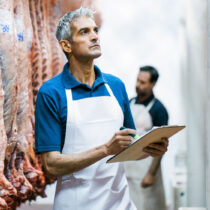Overseas Trade Can Make or Break the UK Meat Industry
The ability to trade overseas is crucial to the viability of the UK meat industry. The income received for the cuts of meat eaten by UK consumers does not come close to covering the cost of buying the animal and processing it. The need to find an outlet for the parts of the animal we do not eat and for which there is, therefore, no market in the UK – known as achieving carcase balance – and the offals and animal by-products is crucial.
The Chinese, in particular, are great consumers of things like pig trotters, pig stomachs, etc, things that for some reason are not eaten by the British. So, although it might seem bizarre that we often export almost as much meat as we import, the figures do not show the whole story.
Exports and imports are about a number of factors: getting value for the whole carcase; cultural eating habits (the Germans, for example, are keen on sow meat, for which there is no market in the UK, and cow meat, which again has little outlet in the UK); the cost of production, which varies according to the season; the price of feed; and, the value of sterling.
Tariffs and Trade Barriers
There is a lot of talk around at the moment about Free Trade Agreements (FTAs), as if they are automatically a good thing. However, there does need to be caution as we do not want the UK flooded with meat from other countries that is either not as well produced as UK meat or simply swamps the market with the concomitant negative impact on British farmers and meat processors.
For an in-depth break-down of the landscape for the meat import/export market you can visit our Imports & Exports page where you’ll find additional information and downloads including The Import/Export Market by Meat Type.







